James Francis Cauty, also known as Rockman Rock, is an English artist and musician, best known as one-half of the duo the KLF, co-founder of the Orb and as the man who burnt £1 million.
Ambient house is a downtempo subgenre of house music that first emerged in the late 1980s, combining elements of acid house and ambient music. The genre developed in chill-out rooms and specialist clubs as part of the UK's dance music scene. It was most prominently pioneered by the Orb and the KLF, along with artists such as Global Communication, Irresistible Force, Youth, and 808 State. The term was used vaguely, and eventually fell out of favor as more specific subgenres were recognized.

Chill Out is the debut studio album by British electronic music group The KLF, released on 5 February 1990. It is an ambient-styled concept album featuring an extensive selection of samples, portraying a mythical night-time journey throughout the U.S. Gulf Coast states, beginning in Texas and ending in Louisiana. Chill Out was conceived as a continuous piece of music, with original KLF music interwoven with samples from songs by Elvis Presley, Fleetwood Mac, Acker Bilk, Van Halen, 808 State and field recordings of Tuvan throat singers.

Martin Glover, better known by his stage name Youth, is a British musician and record producer, best known as a founding member and bassist of the rock band Killing Joke. He is also a member of the Fireman, along with Paul McCartney.
Kristian "Kris" Weston is a British electronic musician, record producer and remixer best known for his work as a member of the Orb. Around the beginning of his career, he worked with Andrew Weatherall on remixes of Meat Beat Manifesto, remixed for Primal Scream, Saint Etienne, U2 and others. He was still a teen when working on the first few albums by the Orb.
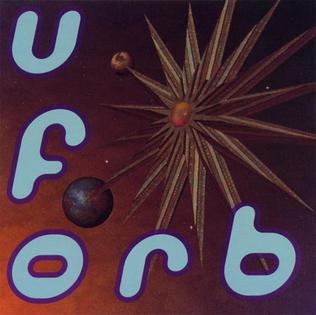
U.F.Orb is the second studio album by English electronic music group the Orb. It was released on 6 July 1992 as their last work with record label Big Life. Upon its release, the album reached No. 1 on the UK Albums Chart. The music database AllMusic described it as "the commercial and artistic peak of the ambient-house movement."

The Orb's Adventures Beyond the Ultraworld is the debut studio album by English electronic music group the Orb, released as a double album on 2 April 1991 by Big Life. It is a segued, progressive and psychedelic trip which draws from various genres and incorporates a huge number of samples and sound effects. Much of the album was recorded after founding member Jimmy Cauty left the group, leaving Alex Paterson as the central member, with additional contributions by Kris Weston, Andy Falconer and several others.

"Little Fluffy Clouds" is a single released by the British ambient house group the Orb. It was originally released in November 1990 on the record label Big Life and peaked at number 87 on the UK Singles Chart. The Orb also included it on their 1991 double album The Orb's Adventures Beyond the Ultraworld. "Little Fluffy Clouds" was re-released several times with different B-sides, with its 1993 re-release reaching number 10 in the UK.
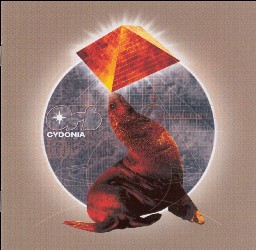
Cydonia is the fifth studio album by English electronic music duo the Orb. It was released on 27 February 2001 in the United Kingdom by Island Records and in the United States by MCA Records. Members Alex Paterson and Thomas Fehlmann, along with usual collaborators Andy Hughes, Nick Burton, and Simon Phillips, wrote and produced the album for a planned 1999 release. Featured on the album are Robert Fripp, John Roome, and Fil Le Gonidec, who had previously only worked with the Orb in live performances.
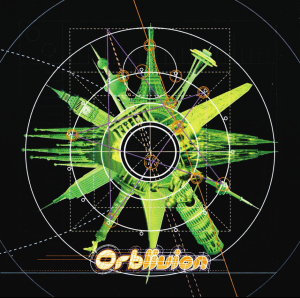
Orblivion is the fourth studio album by English electronic music group the Orb, released on 24 February 1997 by Island Records. With the album, the group, reunited with Andy Hughes and Steve Hillage, returned to their spacy sounds typical of U.F.Orb (1992). Though Orblivion was recorded in May 1996, it was not released until almost a year later, due to Island Records' desire to promote it as a follow-up to U2's Pop.

Orbus Terrarum is a studio album by English electronic music group the Orb that was released on 20 March 1995 by Island Records. Member Kris Weston had begun work on the album before leaving the group. After he left, German producer Thomas Fehlmann joined as a full-time studio member, and the group, now consisting of Alex Paterson, Andy Hughes, and Fehlmann, completed the album. Unlike their previous efforts, Orbus Terrarum features more "earthbound", "organic" sounds in contrast to the psychedelic, science fiction-themed music they had previously written.

The Orb are an English electronic music group founded in 1988 by Alex Paterson and Jimmy Cauty. Known for their psychedelic sound, the Orb developed a cult following among clubbers "coming down" from drug-induced highs. Their influential 1991 debut album The Orb's Adventures Beyond the Ultraworld pioneered the UK's nascent ambient house movement, while its UK chart-topping follow-up U.F.Orb represented the group's commercial peak.

777 is the second studio album by English electronic music group System 7, originally released by Big Life in the United Kingdom in 1993. The album was released in the United States by Hypnotic Records in 1998, after having been unavailable in the country, and was later re-released through System 7 member Steve Hillage's A-Wave label in 2003.

The Dream is the eighth studio album by the English electronic music group the Orb. It was released on 27 August 2007 by Liquid Sound Design, Traffic Inc., and Six Degrees Records and for the first time released on vinyl in 2023. The album represents something of a return to their earlier sound and shares much more in common with their 2004 album Bicycles and Tricycles as opposed to the minimal 2005 release Okie Dokie It's the Orb on Kompakt. Orb member Thomas Fehlmann was absent on the album, and Paterson was instead reunited with Martin Glover, and joined by Tim Bran of Dreadzone.

The discography of European electronic music group the Orb includes seventeen studio albums, one live album, eight compilation albums, four remix albums, four mix albums, two video albums, ten extended plays, thirty-one singles and twenty-two music videos. Founded by Alex Paterson and Jimmy Cauty in 1988, the group's first release was the extended play Kiss EP, issued in May 1989. The single "A Huge Ever Growing Pulsating Brain That Rules from the Centre of the Ultraworld", which marked the group's first foray into the ambient house genre, was released in October 1989 on Adam Morris and Martin Glover's record label WAU! Mr. Modo Recordings. It was later re-issued by Big Life and peaked at number 78 in the United Kingdom despite sample clearance issues. Following Cauty's departure from the group, the Orb signed a long-term recording contract with Big Life and released their debut studio album The Orb's Adventures Beyond the Ultraworld in April 1991. It peaked at number 29 in the United Kingdom and has since been recognized as a seminal album of the ambient house genre. "Little Fluffy Clouds" and "Perpetual Dawn" were released as singles from the album.
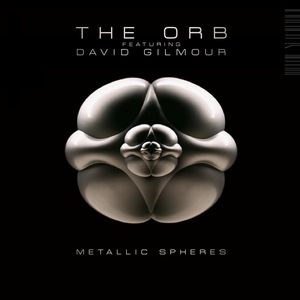
Metallic Spheres is the tenth studio album by the ambient techno group the Orb, released in October 2010. It features the Pink Floyd guitarist David Gilmour and the Killing Joke bassist Youth. It spent three weeks on the UK charts, reaching number 12. In 2023, the album was remixed, partially re-recorded and released as Metallic Spheres in Colour.

Baghdad Batteries (Orbsessions Volume III) is the ninth studio album released by ambient techno group the Orb in September 2009. The album sees Alex Paterson again working with Thomas Fehlmann, and it serves as a continuation of the style the two explored earlier on Okie Dokie It's the Orb on Kompakt.
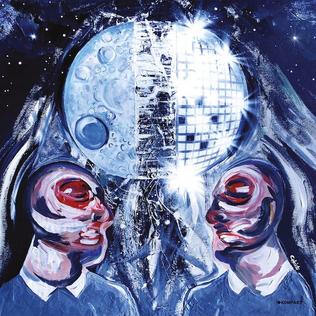
Moonbuilding 2703 AD is the thirteenth studio album from ambient house duo the Orb. It is the first album they released through the Kompakt label since the 2005 release of Okie Dokie It's The Orb on Kompakt. It was released on 22 June 2015.

COW / Chill Out, World! is the fourteenth studio album by ambient house group the Orb. The album was released on 14 October 2016 via the Kompakt label.
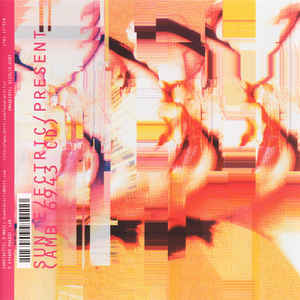
Present is the third album by German techno duo Sun Electric, released in November 1996 by Belgian label Apollo Records. The duo's first full-length studio album for the label, the album is a return to Sun Electric's more beat-oriented material and incorporates styles of dub, jungle, IDM, breakbeat and downtempo. The album artwork by The Designer's Republic features a manipulated image similar to artworks of Madonna, reflecting the melancholic, fractured sound of the album. Music critics greeted Present favourably, praising its inventive style, and some have since recognised the record as overlooked.


















